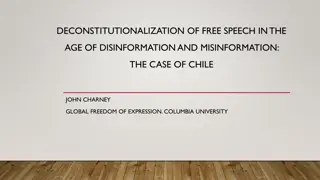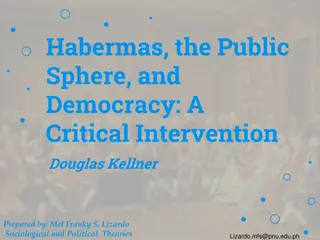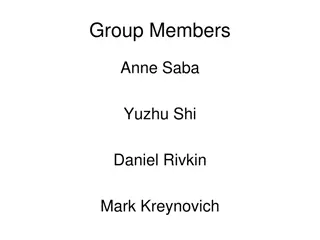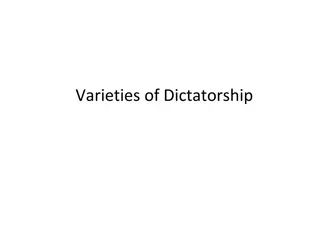Understanding Socialist Democracy: A Political Ideology Explained
Socialist democracy is a political idea that combines elements of democracy and socialism, rejecting capitalism and authoritarian socialism. Proponents advocate for democratic decision-making and public ownership of the means of production. They believe in economic equality, government regulation of
2 views • 13 slides
Rise of Fascism: Impact on European Governments
Explore the rise of fascism in Europe following the Great Depression, as people turned to extreme forms of government for economic recovery and national pride. The emergence of fascist ideologies, authoritarian leaders, and the shift away from democratic systems are examined in relation to the histo
0 views • 12 slides
Hungary's Recent Election: A Closer Look at Political Dynamics
Hungary's recent parliamentary election saw the ruling Fidesz party further consolidate power under Prime Minister Viktor Orban, despite concerns raised by international observers about unfair advantages and lack of fairness. The election results raise questions about the electoral process, media in
0 views • 5 slides
Transforming Hygiene and Sanitation: Approaches and Challenges in Developing Countries
Various countries have implemented different approaches like PHAST, CLTS, and hygiene clubs to improve hygiene and sanitation in their communities. However, challenges such as the demanding nature of PHAST, the need for skilled facilitators, and the limited adaptability of these approaches to urban
0 views • 9 slides
Deconstitutionalization of Free Speech in the Age of Disinformation and Misinformation: The Case of Chile
This chapter explores the impact of disinformation and misinformation on free speech in Chile, focusing on the erosion of constitutional safeguards. It analyzes the role of the legal order in responding to disinformation, the manipulation of online communication rules, and the effects of technical t
0 views • 11 slides
Insights into George Orwell's Nineteen Eighty-Four and Totalitarian Regimes
George Orwell's novel Nineteen Eighty-Four explores themes of oppression, totalitarianism, and political satire inspired by the oppressive regimes of Nazi Germany and Soviet Russia. The story delves into a dystopian society controlled by the Party, led by figures like Big Brother, reflecting Orwell'
1 views • 25 slides
The Rise of Fascism in Italy: The Reign of Mussolini
Italy's post-World War 1 chaos paved the way for Mussolini's rise to power as a dictator. Using violence and intimidation, the Fascists dismantled democracy, centralized power, and promoted extreme nationalism and militarism. Despite promises of order and greatness, Mussolini's regime suppressed dis
0 views • 22 slides
Perspectives on Modernization, Development, and Democracy
Various perspectives on the relationship between modernization, development, and democracy are explored, including the linear view of democracy as a modernization endpoint, the trade-off between development and democracy, and the case for democracy despite authoritarian advantages. The debate betwee
0 views • 16 slides
Islam, Justice, and Democracy: A Study on Religious Values and Political Preferences
This study explores the relationship between Islamic justice values and political preferences, focusing on the impact of religion on democratic and authoritarian orientations. It addresses key research questions regarding the influence of religious values on pious Muslim men and women and their supp
0 views • 22 slides
The Cold War Heats Up: Korea and China Conflict
The post-World War II era saw the U.S. engaging in the Korean War to combat communism, facing off against North Korea and China instead of Russia. Conflict in China between the Nationalists led by Chiang Kai-shek and the Communists under Mao Tse-tung intensified, with Chiang's authoritarian rule spa
0 views • 14 slides
The Nazis' Consolidation of Power in Germany, 1933-1939
In the period between 1933 and 1939, the Nazis under Hitler orchestrated a series of strategies to maintain power in Germany. This included the establishment of a totalitarian state, implementation of social controls, extensive propaganda campaigns, foreign policy decisions, and economic measures. H
0 views • 38 slides
Habermas, the Public Sphere, and Democracy: A Critical Intervention
Explore the critical analysis of Habermas's concept of the public sphere, democracy, and the structural transformation of communication in society. Discussing the origins within the Frankfurt School, this intervention delves into the idealized model of democratic debate and the challenges posed by a
0 views • 24 slides
Understanding Dispositional Factors in Obedience Behavior
Dispositional factors, such as the authoritarian personality developed from strict parenting, play a significant role in influencing obedience behavior. Adorno's research on the authoritarian personality highlights traits like blind respect for authority, conventionalism, and cognitive inflexibility
0 views • 10 slides
Escalation of EU-Hungary Conflicts: Path to Political Capture and Institutional Corruption
Escalating conflicts between the EU and Hungary's Orbán government since 2010 culminated in the suspension of EU funds in 2022 over the lack of reform implementation. The situation reflects a shift from good governance to illiberal democracy and authoritarian rule, with the EU transitioning from a
0 views • 30 slides
The Trade Union Act 2016 - Impact on the Right to Strike
The Trade Union Act 2016 introduced significant restrictions on the right to strike in the UK, including new ballot thresholds, informational duties, notice requirements, and limitations on picketing. These changes aim to curtail the political influence of trade unions and enhance regulation of indu
0 views • 9 slides
Understanding Authoritarian Personality and Obedience Factors
Factors influencing obedience, like the Authoritarian Personality theory by Adorno, suggest that early childhood experiences, especially harsh upbringing, can lead to rigid beliefs, high obedience to authority, and discrimination towards perceived lower-status groups. Adorno's research utilized ques
0 views • 6 slides
Mr. Gore - A Cruel Overseer in Chapter Four
In Chapter Four, Mr. Gore is depicted as a proud, ambitious, and persevering overseer who exhibits extreme cruelty and a lack of empathy towards the slaves. The passage highlights his authoritarian rule, unjust accusations, and relentless punishment, instilling fear and obedience among the enslaved
0 views • 17 slides
Understanding Different Parenting Styles and Strategies
Explore the concepts of parenting styles, from authoritarian to permissive, and the impact they have on children's development. Learn about Dr. MargiAnne Isaia's insights on cultivating intellect in mothers for the sake of their children. Discover the importance of parental behavior in shaping child
0 views • 26 slides
Types of Dictatorships: A Comprehensive Overview
Explore the various classifications and typologies of dictatorships, including monarchic, military, and civilian regimes. Learn how dictators maintain power through support coalitions and understand the differences between these autocratic forms of governance. Delve into examples of monarchic dictat
0 views • 117 slides
Understanding Different Management Styles and Their Concentration of Power
Different management styles, including charismatic, patriarchal, authoritarian, and bureaucratic, vary in their approaches to leadership and decision-making. Charismatic leaders focus on positive behavior and utilize persuasion, while patriarchal leaders make decisions alone in a familial setting. A
0 views • 5 slides
Understanding Leadership Theories and Styles
Leadership involves influencing a group towards a common goal. Traits, interaction styles, and group dynamics play vital roles in effective leadership. Various theories, such as Trait Theories and Synthetic Leadership Theories, provide insights into different aspects of leadership. Understanding lea
0 views • 41 slides
The Rise of Fascism in Europe During the Interwar Years
Post-World War I, Europe faced economic turmoil leading to the rise of fascism, particularly in Italy under Mussolini. Fascism, a nationalist ideology, promoted authoritarian rule, suppression of opposition, and militaristic foreign policies. This extreme system attracted support due to promises of
0 views • 54 slides





















